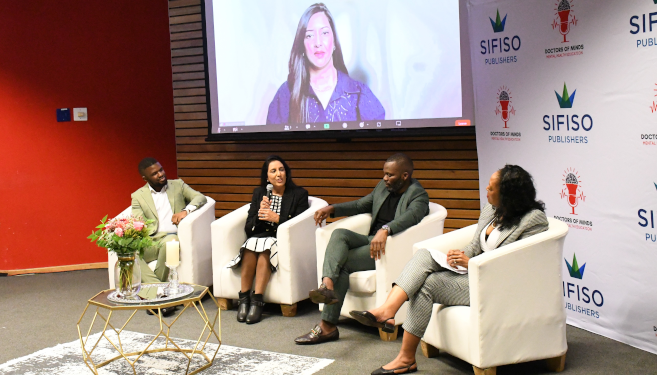 Podcast panellists from left: Dr Bonginkosi Mafuze, Professor Suvira Ramlall, Mr Sabelo Gumede, Dr Judy Dlamini, and Ms Bhavna Devipersad (on the screen).
Podcast panellists from left: Dr Bonginkosi Mafuze, Professor Suvira Ramlall, Mr Sabelo Gumede, Dr Judy Dlamini, and Ms Bhavna Devipersad (on the screen).Doctors of Minds at UKZN Launch Mental Health Podcast
Click here for isiZulu version
A new podcast aimed at mental health education, promotion, and prevention was launched at the Nelson R. Mandela School of Medicine by UKZN alumni and mental health service providers who are part of Doctors of Minds (DoM).
‘Doctors of Minds offers insightful mental health podcast topics that aim to destigmatise conversations surrounding mental health while offering valuable information and support,’ said one of its founders, podcast host and producer, and psychiatry registrar (specialist in training), Dr Bonginkosi Mafuze.
The monthly podcast features individuals who recount their lived experiences, and experts in the field, covering a wide range of topics related to mental well-being, care, treatment, and rehabilitation with a focus on a sound body, mind, and spirit.
It was inspired by a book, Doctor of Hearts co-authored by DoM sponsor and podcast co-producer, Dr Judy Dlamini and Dr Kopano Matlwa Mabaso on the late Professor Bongani Mayosi who lived by the philosophy of “lift as we rise”. All are UKZN alumni.
Employing a multidisciplinary and biopsychosocial approach to address mental health issues and live streamed on UKZN’s YouTube channel, the inaugural podcast featured industry experts, founder and Executive Chair of the Mbekani Group and Sifiso Publishers, Dlamini; Clinical Head of Specialised Psychiatry at the King Dinuzulu Hospital Complex, Professor Suvira Ramlall; Industrial Psychologist and founder of Cloud Therapist and Uphembele Consulting Group, Mr Sabelo Gumede; and Occupational Therapist, Ms Bhavna Devipersad.
Mafuze said it is important to demystify the complexities of mental health and make education on this issue accessible to all.
Dlamini noted that, while Mayosi ‘changed so many people’s lives, there was an elephant in the room because his life was ended by suicide.
‘As a doctor, leader, and mother, I realised that I could not inspire people, particularly young people, by recounting the story of his 51 years of excellent life and not talk about how his life ended as this highlights the need for mental health awareness and taking care of oneself.’
‘It is unfortunate that the word “mental” has so many negative connotations,’ said Ramlall. ‘We equate it with craziness and sometimes being dumb.’
She added that for a computer to work efficiently it needs both hardware and software. ‘The hardware is the body; the physical apparatus, which is important. But the empty shell is useless without the inside - the software, the battery. I like to think of mental health as that inner apparatus.’
Ramlall noted that people pay little attention to what happens in the mind (one’s thoughts), and the heart (feelings and emotions), and what defines one as an individual (one’s values) and at a spiritual level. ‘All these domains happen silently within us, but we underestimate their power because what is happening on the inside influences that occurring on the outside… For me, this constitutes mental health. It’s about the health, the state of wellness, the strength and the resilience of that software inside us that plays such an important role in our overall health.’
She observed that doctors are tasked to look after people, not how to take care of themselves. They should also prioritise their own mental health. ‘If you are concerned about your mental health, look for change. First, define the baseline; you know you! Happiness is not a straight line.’
Gumede unpacked the difference between psychiatrists who treat mental illness medically and psychologists who are involved in the study of the mind and behaviour through psychotherapeutic methods. He added that a holistic approach is required to tackle mental health issues. Devipersad concurred and highlighted the role of occupational therapists within the mental health care team. These therapists are trained mental health providers who work within a multidisciplinary team to help patients achieve optimal levels of functioning through meaningful therapy.
The panel discussion and question and answer sessions were robust and interactive, with the audience reflecting on how mental health and anxiety eventually lead to depression, burnout, and prolonged anxiety, not just at work but also at home and within social circles.
DoM will announce its upcoming podcast dates. They can be followed via their social media pages.
Facebook: Doctors of Minds
Instagram: @doctorsofminds
Words and photograph: Lunga Memela



